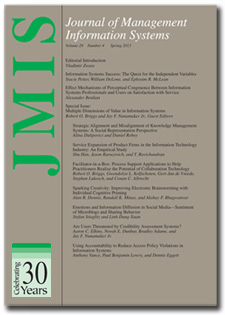Servitization for the Environment? The Impact of Data-Centric Product-Service Models
IF 6.2
2区 管理学
Q1 COMPUTER SCIENCE, INFORMATION SYSTEMS
引用次数: 2
Abstract
ABSTRACT Recent developments in data-centric technologies (e.g., big data, Internet of Things, cloud computing) have given rise to the data-centric models, such as servitization. Servitization here refers to firms selling a product as a service instead of selling product ownership, which has been viewed as a green business model that can benefit the environment. Despite the potential environmental superiority of servitization, previous studies and empirical observations have shown that the servitization model may generate lower profits than the conventional product sales model, which poses challenges for firms to choose their business models. However, the existing literature has not considered the role of data-centric technologies that are increasingly embedded in the servitization model, in which firms can co-create value with consumers by leveraging product usage data to improve service offerings. In this study, we build an analytical model to scrutinize the economic and environmental performance of the data-centric servitization model compared to the product model. We find that the data-centric servitization model is more profitable than the product model only when a firm’s service improvement capability is relatively high. Unfortunately, a high service improvement capability may exacerbate the negative environmental impact, resulting in the servitization model being less environmentally friendly than the product model. We discuss the circumstances under which using the servitization model can yield win-win outcomes in terms of profitability and environmental impact. The findings can help managers and policymakers reconcile the tension between firm profitability and environmental damage and make judicious decisions on business model choices and the application of emerging data-centric technologies.为环境服务?以数据为中心的产品服务模型的影响
摘要以数据为中心的技术(如大数据、物联网、云计算)的最新发展催生了以数据为核心的模型,如服务化。这里的服务化是指公司将产品作为服务出售,而不是出售产品所有权,这被视为一种有利于环境的绿色商业模式。尽管服务化具有潜在的环境优势,但先前的研究和实证观察表明,服务化模式可能产生比传统产品销售模式更低的利润,这给企业选择商业模式带来了挑战。然而,现有文献没有考虑以数据为中心的技术的作用,这些技术越来越多地嵌入服务化模型中,在该模型中,企业可以通过利用产品使用数据来改善服务,从而与消费者共同创造价值。在这项研究中,我们建立了一个分析模型,与产品模型相比,仔细检查以数据为中心的服务化模型的经济和环境性能。我们发现,只有当企业的服务改进能力相对较高时,以数据为中心的服务化模型才比产品模型更有利可图。不幸的是,高服务改进能力可能会加剧负面的环境影响,导致服务化模式不如产品模式环保。我们讨论了在何种情况下使用服务化模式可以在盈利能力和环境影响方面产生双赢的结果。这些发现可以帮助管理者和决策者调和企业盈利能力和环境损害之间的紧张关系,并就商业模式选择和新兴数据中心技术的应用做出明智的决定。
本文章由计算机程序翻译,如有差异,请以英文原文为准。
求助全文
约1分钟内获得全文
求助全文
来源期刊

Journal of Management Information Systems
工程技术-计算机:信息系统
CiteScore
10.20
自引率
13.00%
发文量
34
审稿时长
6 months
期刊介绍:
Journal of Management Information Systems is a widely recognized forum for the presentation of research that advances the practice and understanding of organizational information systems. It serves those investigating new modes of information delivery and the changing landscape of information policy making, as well as practitioners and executives managing the information resource.
 求助内容:
求助内容: 应助结果提醒方式:
应助结果提醒方式:


